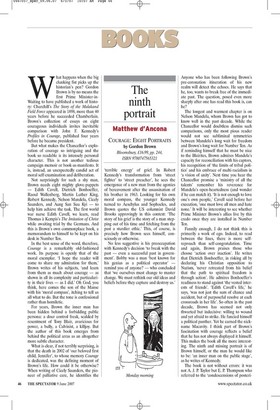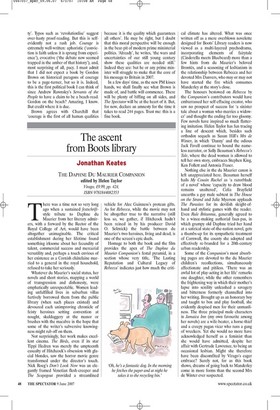The ninth portrait
Matthew d'Ancona COURAGE: EIGHT PORTRAITS by Gordon Brown Bloomsbury, £16.99, pp. 244, ISBN 9780747565321 Ivhat happens when the big clunking fist picks up the historian's pen? Gordon Brown is by no means the first Prime Minister-inWaiting to have published a work of history: Churchill's The Story of the Malakand Field Force appeared in 1898, more than 40 years before he succeeded Chamberlain. Brown's collection of essays on eight courageous individuals invites inevitable comparison with John E Kennedy's Profiles in Courage, published four years before he became president.
But what makes the Chancellor's exploration of courage so intriguing and the book so readable is its intensely personal character. This is not another tedious campaign memoir or book-as-manifesto. It is, instead, an unexpectedly candid act of moral self-examination and deliberation.
Not surprisingly for such a shy man, Brown needs eight mighty glove-puppets — Edith Cavell, Dietrich Bonhoeffer, Raoul Wallenberg, Martin Luther King, Robert Kennedy, Nelson Mandela, Cicely Saunders, and Aung San Suu Kyi — to help him achieve the task. The first world war nurse Edith Cavell, we learn, read Thomas a Kempis's The Imitation of Christ while awaiting trial by the Germans. And this is Brown's own commonplace book, a memorandum to himself to be kept on his desk in Number Ten.
In the best sense of the word, therefore, Courage is a remarkably old-fashioned work. Its purpose is openly that of the moral exemplar. 'I hope the reader will come to share my admiration for them,' Brown writes of his subjects, 'and learn from them as much about courage — as shown in all its complexity and particularity in their lives — as I did.' Oh God, you think, here comes the son of the Manse with his 'moral compass', itching to tell us all what to do. But the tone is confessional rather than homiletic.
For years, Brown the inner man has been hidden behind a forbidding public persona: a dour control freak, scalded by resentment of Tony Blair, avaricious for power, a bully, a Calvinist, a killjoy. But the author of this book emerges from behind the political arras as an altogether more subtle character.
What is clear, if not terribly surprising, is that the death in 2002 of 'our beloved first child, Jennifer', to whose memory Courage is dedicated, was the defining moment of Brown's life. How could it be otherwise? When writing of Cicely Saunders, the pioneer of palliative care, he identifies the 'terrible energy' of grief. In Robert Kennedy's transformation from 'street fighter' to 'street preacher', he sees the emergence of a new man from the agonies of bereavement after the assassination of his brother in 1963. Looking for his own moral compass, the younger Kennedy turned to Aeschylus and Sophocles, and Brown quotes the US columnist David Brooks approvingly in this context: 'The story of his grief is the story of a man stepping out of his time and fetching from the past a sturdier ethic.' This, of course, is precisely how Brown sees himself, consciously or otherwise.
No less suggestive is his preoccupation with Kennedy's decision 'to break with the past — even a successful past in government'. Bobby was a man 'best known for his genius as a political operator' — remind you of anyone? — who concluded that 'we ourselves must change to master change. We must rethink our old ideas and beliefs before they capture and destroy us.'
Anyone who has been following Brown's pre-coronation itineration of his new realm will detect the echoes. He says that he, too, wants to break free of the immediate past. The question, posed even more sharply after one has read this book is, can he?
The longest and warmest chapter is on Nelson Mandela, whom Brown has got to know well in the past decade. While the Chancellor would doubtless dismiss such comparisons, only the most pious reader would not see subliminal symmetries between Mandela's long wait for freedom and Brown's long wait for Number Ten. As if reminding himself that he must be nice to the Blairites, Brown admires Mandela's capacity for reconciliation with his captors, his recognition of `the limits of tribal politics' and his embrace of multi-racialism in 'a vision of unity'. Next time you hear the Chancellor promise a 'ministry of all the talents' remember his reverence for Mandela's open-heartedness (and wonder if he can match it). 'It is not enough to love one's own people,' Cavell said before her execution, 'one must love all men and hate none.' It will be interesting to see whether Prime Minister Brown's allies live by this credo once they are installed in Number Ten.
Funnily enough, I do not think this is primarily a work of ego. Indeed, to read between the lines, there is more selfreproach than self-congratulation. Time and again, Brown praises those who choose 'action over inaction'. He writes that Dietrich Bonhoeffer, in risking all by declaring his Christian opposition to Nazism, 'never retreated from his belief that the path to spiritual freedom is through action'. He admires Bonhoeffer's readiness to stand against `the vested interests of friends'. 'Edith Cavell's life,' he says, 'was not just the sum of chance and accident, but of purposeful resolve at each crossroads in her life'. So often in the past decade, Brown has seemed not only thwarted but indecisive: willing to wound and yet afraid to strike. He fancied himself a political panther. Yet he earned the nickname Macavity. I think part of Brown's fascination with courage reflects a belief that he has not always displayed it himself. This makes the book all the more interesting. The ninth and missing portrait is of Brown himself, or the man he would like to be: 'an inner man on the public stage', as he writes of Kennedy.
The book is not without errors: it was not A. J. P. Taylor but E. P. Thompson who referred to the 'condescensions of posterity'. Typos such as `revolutionlise' suggest over-hasty proof-reading. But this is selfevidently not a rush job. Courage is extremely well-written: aphoristic (conviction is faith unless it is sprung from experience'), evocative (the debate now seemed trapped in the amber of that history'), and, most surprising of all, pacy. I must admit that I did not expect a book by Gordon Brown on historical paragons of courage to be a page-turner, but so it is. Indeed, this is the first political book I can think of since Andrew Rawnsley's Servants of the People to have a claim to be a beach-read. Gordon on the beach? Amazing, I know. But credit where it is due.
Brown agrees with Churchill that 'courage is the first of all human qualities because it is the quality which guarantees all others'. He may be right, but I doubt that this moral perspective will be enough in the bear-pit of modern prime ministerial politics. 'Already', he writes, `the wars and uncertainties of our still young century show these qualities are needed still.' Indeed they are: but he or any prime minister will struggle to make that the core of his message to Britain in 2007.
In a few days' time, as the new PM kisses hands, we shall finally see what Brown is made of, and battle will commence. There will be plenty of biffing on all sides, and The Spectator will be at the heart of it. But, for now, declare an amnesty for the time it takes to read 244 pages. Trust me: this is a fine book.





























































 Previous page
Previous page